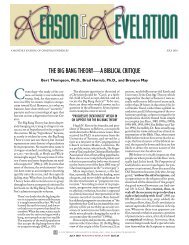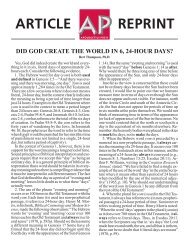The Many Faces, and Causes, of Unbelief - Apologetics Press
The Many Faces, and Causes, of Unbelief - Apologetics Press
The Many Faces, and Causes, of Unbelief - Apologetics Press
You also want an ePaper? Increase the reach of your titles
YUMPU automatically turns print PDFs into web optimized ePapers that Google loves.
than Oxford pr<strong>of</strong>essor Richard Dawkins conceded as much.<br />
In his book, <strong>The</strong> Selfish Gene, Dr. Dawkins discussed at great<br />
length the gene’s role in the naturalistic process <strong>of</strong> “survival<br />
<strong>of</strong> the fittest” <strong>and</strong> admitted that, according to the evolutionary<br />
paradigm, genes are “selfish” because they will do whatever<br />
it takes to ensure that the individual in which they are<br />
stored produces additional copies <strong>of</strong> the genes. In commenting<br />
on the effects <strong>of</strong> such a concept on society as a whole, he<br />
then lamented: “My own feeling is that a human society based<br />
simply on the gene’s law <strong>of</strong> universal ruthlessness would be a<br />
very nasty society in which to live” (1989b, p. 3).<br />
When men act consistently, when men act congruously,<br />
<strong>and</strong> when men act correctly—in keeping with the cardinal doctrines<br />
<strong>of</strong> their respective world views—which system has more<br />
to recommend itself, belief or unbelief? To ask is to answer, is<br />
it not? One system—belief—teaches that we should esteem others<br />
better than ourselves, love our neighbors, <strong>and</strong> be self-sacrificing<br />
even unto death. <strong>The</strong> other—unbelief—teaches a “survival<br />
<strong>of</strong> the fittest” concept that makes nature “red in tooth<br />
<strong>and</strong> claw” so that the strong subjugates the weak, might makes<br />
right, <strong>and</strong> “selfish genes” ensure that it is “every man for himself.”<br />
Truth be told, whom would you rather have for your<br />
neighbor—the believer, or the unbeliever?<br />
UNBELIEF<br />
When you see the above section heading <strong>of</strong> “<strong>Unbelief</strong>”<br />
listed as a cause <strong>of</strong> unbelief, you might think that surely I<br />
have erred. How, pray tell, could unbelief be a cause <strong>of</strong> unbelief?<br />
Please allow me to explain.<br />
It is my contention that unbelief engenders more unbelief.<br />
In his book, <strong>The</strong>refore St<strong>and</strong>, Wilbur M. Smith compared<br />
unchecked unbelief to<br />
...a contagious disease. Unless it is restrained it grows<br />
in intensity, <strong>and</strong> will infect an increasingly large number<br />
<strong>of</strong> people. It is difficult to determine whether this<br />
is an age <strong>of</strong> unbelief because so many men do not believe,<br />
or many men do not believe because it is an age<br />
- 115

















